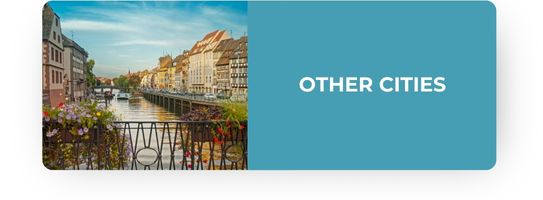How to write a French CV

So, you’re thinking of applying to jobs in France? Great! It’s time to get your CV ready. Depending on the job you are applying for, employers might ask for your résumé in English, French or both. You could directly translate the one you already have, but it is generally better to start from scratch, as there are certain differences in the content required. In this article, we will take you through the steps of creating an outstanding French résumé.
1. Structure your CV for French employers
Employers in France do not tend to value over-selling yourself. While a British or American résumé might talk about your ‘outstanding people skills’, French CVs tend to be more factual and to the point. Moreover, in France, résumés tend to contain more personal details, such as your nationality, date of birth, and marital status, whereas in many other countries this wouldn’t be appropriate.
Below is an example template to help you structure your résumé:

And here is a summary of the content you will need to write in each section:
Head-shot
In France, as with many other European countries, including a photo of yourself is encouraged. Add a passport sized, professional looking head-shot to the top of your CV.
Présentation
Put your name, date of birth, nationality and contact details in the first section of your résumé, in a clear list format. If you like, you can also include underneath a couple of sentences summarising your qualities, but this can also be saved for the cover letter of your application.
Formation
Summarise your education history from most recent to least. Include school names, qualifications, grades and dates. Make it as easy as possible for the employer to read over your application and find all the relevant information quickly.
Expérience professionnelle
Put down all of your professional experience from most recent to least. Include company names, dates and a brief description of your position and responsibilities within each job.
Compétences spécifiques
What skills do you have that would be useful in a work environment? Include information on your language skills, IT abilities, and any other qualifications you have.
Centres d’intérêts
Write a bit about you. What are your hobbies? What are some of your best personal or extra-curricular achievements? Mention some examples to show the employer that you are a well-rounded, interesting individual.
2. Use the correct vocabulary
There are many useful translation sites that can be used if you’re stuck, such as this in depth list of résumé related vocabulary and example phrases.
3. Find equivalent qualifications
Have you ever seen ‘Bac+3 required’ on a French job description and been completely confused? There is not only a language barrier to contend with here, but also an entirely different education system to navigate. When listing GCSEs or A levels, it is simplest just to write them as you would for an English résumé, but it’s still good to know in case you are asked. Below are some of the French equivalents to British qualifications.
Baccalauréat – A levels/ exams that allow you to apply to university
BTS/ DUT/ IUT – 2 years after completing the Bac
License or Bachelor – 3 years after completing the Bac, equivalent to most Undergraduate degrees
Maîtrise/ Master – 5 years after completing the Bac, equivalent to most Master’s degrees
Bac+(x) – The number (x) is equivalent to the years spent in education after achieving the Baccalaureate.
And here is a rough guide to translate your degree mark:
70+% – mention très bien
60+% – mention bien
50+% – mention assez bien
40+% – sans mention
4. Include your nationality
Maybe you’re not fluent in French just yet, but you’ve still got a lot to bring to the table. Make sure your résumé includes your nationality and language skills. Write about how your international perspective could be an asset to the company. Many employers value language skills highly, so highlight those that you are fluent in, and include your level of French according to the CECRL language grades (A1 – C2).
5. Check and check again
If you’re not fluent in French, it can be difficult to know whether your writing is accurate or not. However it is incredibly important to make sure that there aren’t any spelling or grammar mistakes in your résumé, as they will make you come across as very unprofessional. Aside from a basic spell check, there are several ways to make sure that your CV is thoroughly proof-read.
You can use an online grammar checker such as Scribens and Bon Patron. These will flag up basic errors in gender agreements, verb endings, and so on, and are well worth a try.
However, there are many more nuanced problems that an online grammar checker will be not able to pick up on. For this reason, it can be a good idea to ask someone who is fluent in French to check your résumé. If you don’t know anyone in real life, you could use a website such as Lang-8, where native speakers go through and correct your writing. These sites do tend to charge, but it’s usually not a huge amount, and it’s well worth it if it helps you secure your dream job!
We hope that this guide helps you to create a professional French résumé to impress future employers in order to secure your dream job!
Are you looking for an apartment in Paris?
Lodgis offers a fabulous selection of furnished apartments for rent. We offer over 7,500 properties, from studio to family apartments with period features, spacious dining and living areas, terraces, elevator access…and just about anything!














